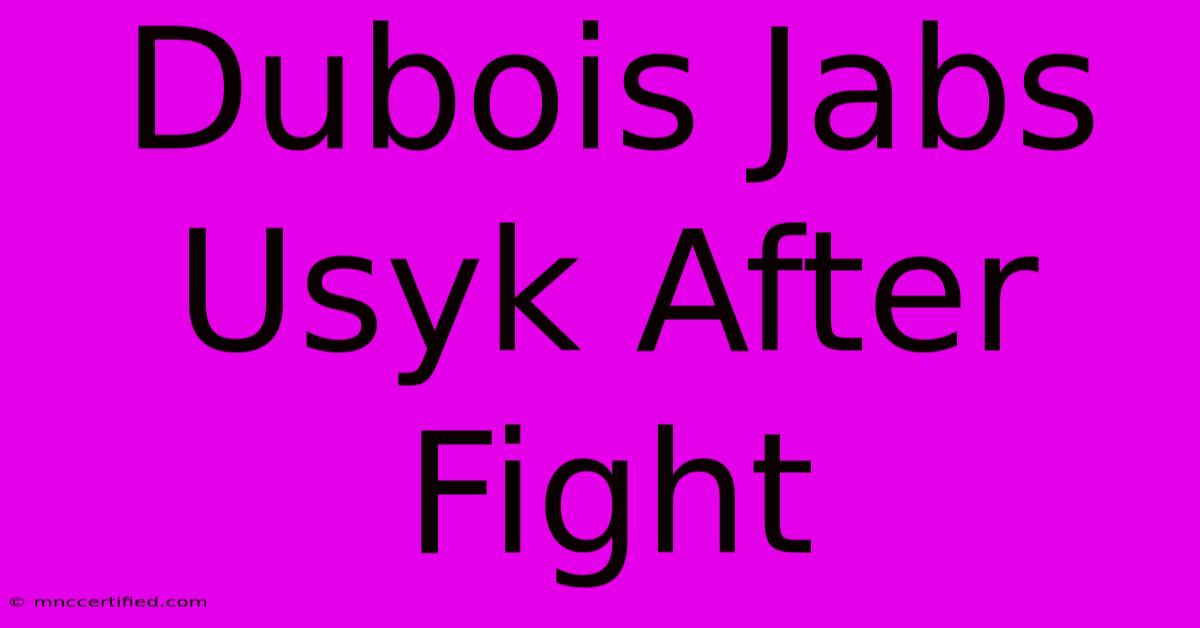Dubois Jabs Usyk After Fight

Table of Contents
Dubois Jabs Usyk After Fight: Controversy and Aftermath
The heavyweight boxing world is buzzing after Daniel Dubois' controversial fight against Oleksandr Usyk. Dubois, the challenger, landed a significant low blow that momentarily incapacitated Usyk, leading to a point deduction and sparking heated debate about the referee's decision and the fight's outcome. This article delves into the key moments of the fight, the controversy surrounding the low blow, and the aftermath of the event.
The Fight: A Clash of Styles
The fight itself was a captivating display of contrasting styles. Usyk, the undisputed heavyweight champion, showcased his exceptional footwork, speed, and ring generalship. Dubois, known for his power punching, attempted to exploit Usyk's perceived vulnerability to body shots. The early rounds saw a cautious Usyk circling and countering, while Dubois pressed forward, aiming for a knockout blow.
The Infamous Low Blow
The pivotal moment arrived in the ninth round. Dubois landed a powerful shot that clearly connected below the belt. Usyk immediately doubled over in pain, requiring a considerable amount of time to recover. Referee Luis Pabon, after consulting with the ringside doctor, deducted a point from Dubois for the foul. This decision ignited immediate controversy.
The Controversy: Was it a Point Deduction or a Disqualification?
The controversy stems from the referee's decision to deduct a point rather than disqualify Dubois. Many boxing experts and fans argued that the low blow was intentional, warranting a disqualification. Others defended Pabon's ruling, citing the lack of malicious intent and the overall context of the fight. The debate highlights the subjective nature of refereeing decisions in boxing, particularly in high-stakes championship bouts. The incident also raises questions about the consistency of officiating in professional boxing, demanding a more transparent and standardized approach to such situations. The question remains: should a low blow, regardless of intent, automatically result in disqualification in a championship fight?
Social Media Explodes
The fight and its controversial ending immediately became a trending topic on social media. Boxing fans, analysts, and even former boxers weighed in with their opinions, fueling the ongoing debate. #DuboisUsyk trended globally, showcasing the significant reach and impact of the event. The online discussions further amplified the controversy, demonstrating the power of social media in shaping public opinion surrounding major sporting events.
The Aftermath: Reactions and Future Implications
Following the fight, both Dubois and his team expressed their disappointment with the outcome. Dubois, while acknowledging the low blow, maintained he did not intentionally strike below the belt. Usyk, while clearly affected by the blow, ultimately secured the victory by technical knockout in the ninth round, preserving his undefeated record.
The incident raises important questions for future boxing matches. It highlights the need for clearer guidelines and consistent application of rules regarding low blows and their penalties. The debate generated considerable discussion about the role of referees and their decision-making power, particularly in highly charged moments of a fight.
This controversy will undoubtedly impact the future of heavyweight boxing, possibly leading to a review of the rules and refereeing protocols. The Dubois vs. Usyk fight serves as a stark reminder of the intricacies and controversies inherent in the sport, leaving a lasting impression on fans and professionals alike. The lasting impact on Dubois' career and the potential for a rematch remain to be seen. The future holds many unanswered questions, and only time will tell how this incident shapes the future of the sport.

Thank you for visiting our website wich cover about Dubois Jabs Usyk After Fight. We hope the information provided has been useful to you. Feel free to contact us if you have any questions or need further assistance. See you next time and dont miss to bookmark.
Featured Posts
-
Darts Littler Wins Tough Match
Dec 22, 2024
-
Blake Livelys It Ends With Us Complaint
Dec 22, 2024
-
Millions Gain Social Security Coverage
Dec 22, 2024
-
Mlbs Base Stealing Record Rickey Henderson
Dec 22, 2024
-
Dubois Crashes Usyk Interview
Dec 22, 2024